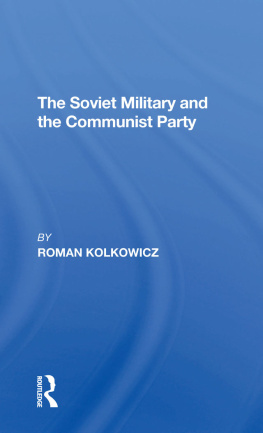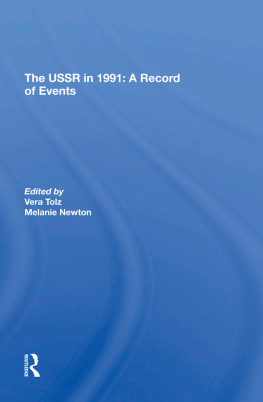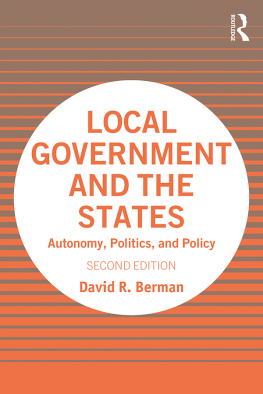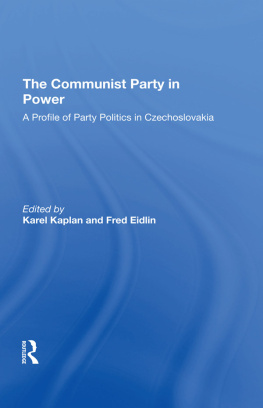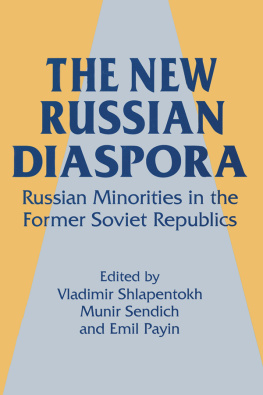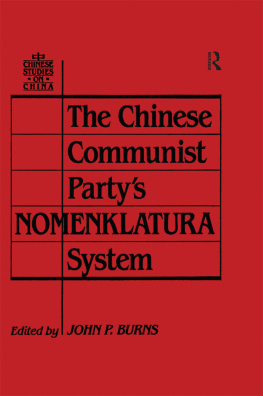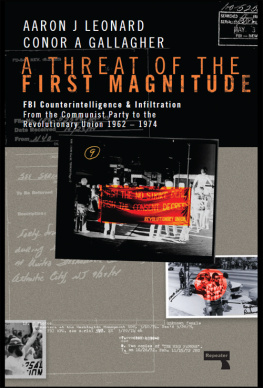
Moscow and the Non-Russian Republics in the Soviet Union
This book examines what came to determine the local power and character of the Communist party-state at the level of the national non-Russian republics. It discusses how, although the Soviet Union looked centralized and monolithic to outsiders, local party-states formed their own fiefdoms and had very considerable influence over many policies areas within their republics. It argues that local party-states were shaped by two decisive relationships to the central Communist party in Moscow and to local constituencies, especially to the local intelligentsia and the creative professions who constituted the local party-states biggest potential adversaries. It shows how local party-states negotiated stability and their own survival, and contends that the effects of Sovietization continue to be felt in the independent states which succeeded the republics, particularly in the field of the relationship with Moscow, which remains of immense importance to these countries.
Li Bennich-Bjrkman is Johan Skytte Professor in Eloquence and Political Science at the University of Uppsala, Sweden
Saulius Grybkauskas is a Senior Research Fellow and Deputy Director for Academic Affairs at the Lithuanian Institute of History
BASEES/Routledge Series on Russian and East European Studies
For a full list of available titles please visit: https://www.routledge.com/BASEES-Routledge-Series-on-Russian-and-East-European-Studies/book-series/BASEES
Series editors:
Sociology and anthropology: Judith Pallot (President of BASEES and Chair), University of Oxford
Economics and business: Richard Connolly, University of Birmingham
Media and cultural studies: Birgit Beumers, University of Aberystwyth
Politics and international relations: Andrew Wilson, School of Slavonic and East European Studies, University College London
History: Matt Rendle, University of Exeter
This series is published on behalf of BASEES (the British Association for Slavonic and East European Studies). The series comprises original, highquality, research-level work by both new and established scholars on all aspects of Russian, Soviet, post-Soviet and East European Studies in humanities and social science subjects.
Business Culture in Putins Russia
John Kennedy
The Donbas Conflict in Ukraine
Elites, Protest, and Partition
Daria Platonova
Siberian Exile and the Invention of Revolutionary Russia, 1825-1917
Exiles, migrs and the International Reception of Russian Radicalism
Ben Phillips
Moscow and the Non-Russian Republics in the Soviet Union
Nomenklatura, Intelligentsia and Centre-Periphery Relations
Edited by Li Bennich-Bjrkman and Saulius Grybkauskas
Conservatism and Memory Politics in Russia and Eastern Europe
Edited by Katalin Miklssy and Markku Kangaspuro
Projecting Russia in a Mediatized World
Recursive Nationhood
Stephen Hutchings
First published 2022
by Routledge
2 Park Square, Milton Park, Abingdon, Oxon OX14 4RN
and by Routledge
605 Third Avenue, New York, NY 10158
Routledge is an imprint of the Taylor & Francis Group, an informa business
2022 selection and editorial matter, Li Bennich-Bjrkman and Saulius Grybkauskas; individual chapters, the contributors
The right of Li Bennich-Bjrkman and Saulius Grybkauskas to be identified as the authors of the editorial material, and of the authors for their individual chapters, has been asserted in accordance with sections 77 and 78 of the Copyright, Designs and Patents Act 1988.
All rights reserved. No part of this book may be reprinted or reproduced or utilised in any form or by any electronic, mechanical, or other means, now known or hereafter invented, including photocopying and recording, or in any information storage or retrieval system, without permission in writing from the publishers.
Trademark notice: Product or corporate names may be trademarks or registered trademarks, and are used only for identification and explanation without intent to infringe.
British Library Cataloguing-in-Publication Data
A catalogue record for this book is available from the British Library
Library of Congress Cataloging-in-Publication Data
A catalog record has been requested for this book
ISBN: 978-1-032-15540-1 (hbk)
ISBN: 978-1-032-15547-0 (pbk)
ISBN: 978-1-003-24460-8 (ebk)
DOI: 10.4324/9781003244608
We want to thank the Institute for Russian and Eurasian Studies (IRES) at Uppsala University, The Royal Society of Arts and Sciences in Uppsala, Lithuanian Institute of History in Vilnius, and the Research Council of Lithuania for generous support in making it possible for this volume to see the light of day. The National Academy of Pedagogical Sciences in Ukraine, and particularly Vasyl Kremen and Sergiy Kurbatov, deserve an equal recognition for hosting our mid-way workshop with the authors and the editors in April 2019 in Kyiv.
We are both part of vibrant intellectual environments, at Uppsala University and its IRES and Department of Government, and Lithuanian Institute of History in Vilnius. The open-mindedness and curiosity that thereby surround us, is worth cherishing, since it contribute to a creative climate which inspire and help to formulate new insights.
Li Bennich-Bjrkman and Saulius Grybkauskas
DOI: 10.4324/9781003244608-1
The once commonly held view in the West of the Soviet Union as virtually monolithic and streamlined into grey uniformity in contrast to the technicoloured world of the West has been successfully challenged by a scholarly understanding that allows for more complexity and nuance. Everyday life continued for decades in the Soviet Union, generations grew up and grew old, patterns of economic and social relations crystallized into established practice as lifes joy and despair continued to leave their marks ().
Even if developments after 1991 in what became fifteen independent states were not to foreseeable, how the Soviet era played out on the republican level, and particularly in the post-Stalin decades that offered greater opportunities for individual initiative and strategic decision-making, has continued to shape national paths.
The Soviet centre and periphery
Patterns of governance, framed by the triangular relationship between the Centre in Moscow, the local Party-states in the republics, and their national intelligentsias, created what we claim to be multiple Soviet models with legacies that varied once independence was established. How these governance patterns formed and developed after the death of Joseph Stalin in 1953 is the focus of this book.
Moscow, and by extension the Kremlin, or Staraya Ploschad (Old Square, the headquarters of the Central Committee of the Soviet Communist Party [CC CPSU]), is a prevailing geographical place in the political history of USSR. This book is about the Soviet republics and that means Moscow was the main variable in the above-mentioned triangle. The Moscow factor played an even greater role within its own, that is Soviet, republics than in other Communist countries. If, in the case of the satellite states, their ruling parties had more latitude to deal with society and Moscows intervention was rare, in the Soviet republics the leaderships were always under Moscows permanent supervision. Moscows interventions, the ongoing control, changed the relationship with the Soviet republics dramatically compared to the Eastern European Communist countries. The aim of the local


